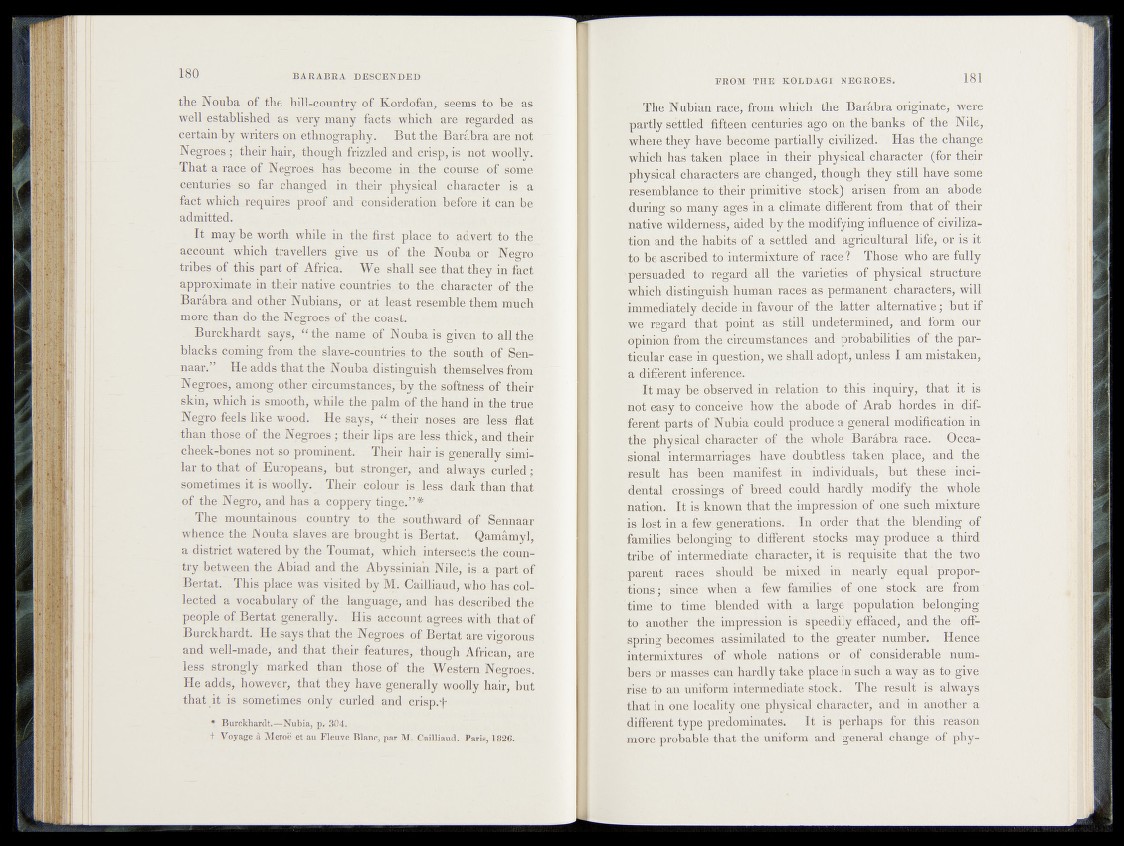
the Nouba of the hill-country of Kordofan, seems to be as
well established as very many facts which are regarded as
certain by writers on ethnography. But the Barabra are not
Negroestheir hair, though frizzled and crisp, is not woolly.
That a race of Negroes has become in. the course of some
centuries- so far changed in their physical character is a
fact which requires proof and consideration before it can be
admitted.
It may be worth while in the first place to advert to the
account which travellers give us of the Nouba Or Negro
tribes of this part of Africa; We shall see that they in fact
approximate in their native countries, to the, character of the
Barabra and other Nubians, or at least resemble them much
more than do the Negroes of the coast.
Burckhardt says, “ the name of Nouba is given to all the.
blacks coming from the slave-countries,.to the south of.Sen-
naar.” He adds that the Nouba distinguish themselves from
Negroes* among other circumstancevby the softness' of their
skin, which is smooth, while the palm of the hand in the tru§/
Negro feels like wood, lie says, “ their noses are less flat
than those of the Negroes; their lips are less thick, and their
cheek-bones not so prominent. Their hair is generally similar
to that of Europeans, but stronger, and always curled;
sometimes it is woolly. Their colour is. less dark than that
of the Negro, and has a coppery tinge/’ *
The mountainous country to the southward pf Sennaar
whence the Nouba slaves, are brought is Bertat. Qamamyl,
a district watered by the Toumat, which intersects the country
between the Abiad and the Abyssinian Nile, is. a part of
Bertat. This place was visited by M. Cailliaud, whoiias collected
a vocabulary of the language, and has described the
people of Bertat generally. His account agrees with that of
Burckhardt. He says that the Negroes of Bertat are vigorous
and well-made, and that their features, though African, are
less strongly marked than those of the Western Negroes.
He adds, however, that they have generally woolly hair, but
that it is sometimes only curled and crisp.f
* Burckhardt.—Nubia, p. 304.
t Voyage a Meroe et au Fleuve Blanc, par M. Cailliaud. Paris, 1826.
The Nubian race, from which the Barabra originate, were
partly settled fifteen'chnfefteS' dgo^^nV the banks of the Nile,
where they have become partially civilized. Has the change
which has taken place in their physicaycharacter ■ (for their
physical characters afeuhanged, though$l|eyrli still have some
resemblance Jto"‘tlieir primitive stock): arisen from an abode
during so many ages in a" climate different.'from 'that;of .their
native wilderness, aidedvby the modifying influence of; civilization
and the habits of a settled and agrfedlturay iife/'OB'is it
to be ascribed to intermixture(e# race ?' .• Those;.who are fully
‘persuaded to regard all thé 'varietaës^of physical' striiciufë7
whicf/distinguish human races as »permsmeht. characters, will
J&imediately d|IMe in favour of the latter altem&tife| but if
we regard that point as still undetermined^' and form our
opinion from ffi-erV^umstaricës' and probabilities of ', the "particular
*cassein question, we shall adopt,'funless I am mistaken,
a different inference.
It may* be observed in relation, to this inquiry, that it “is
not easy to conceive how the abode ;of Arab 'hordes, in different
parta of Nubia could produce'a general modification in
the physical character of the whole Barabra race.’ :©,ce.ar
sional intermarriages have doubtless, taken place,, and the'
result has been manifest in individuals, but these incidental
crossings of bleed could hardly modify the whole
nation. It is known that the impression of'b^suoh mixture
is lost in a few. generations.. In order that .the blending .of
families belonging to different stocks may.produce a third
tribe of intermediate character, it ^requisite that the two
parent races should be mixed hi nearly equal proportions
; since when a few families oh one stock, are from
Time to time blended with a large population belonging
to another the impression is speedily effaced, and the offspring
becomes assimilated to the greater number. Hehbe,
intermixtures of whole nations or of ; considerable numbers
or masses can hardly take place in such a way. as to give
rise to an uniform intermediate stock. The ’fesult is always
that in One. locality one physical; charactepfand in anóthéifa
different type predominates. It,is perhaps for this reason
more probable that the uniform and general change of phy